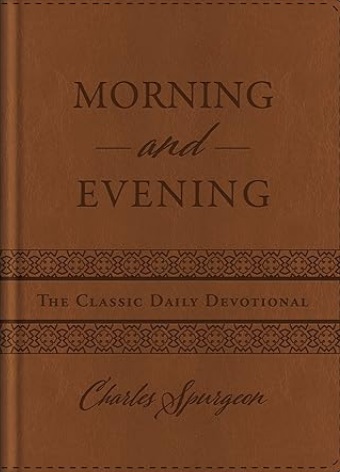Charles Spurgeon was famously afflicted with both depression and anxiety in his life.
And as a 19th century Baptist preacher, he was far ahead of his time in recognizing that it was a physical disease, not a mental one.
I want to make that clear.
Spurgeon believed it was physical before most doctors even knew. Now we know.
So if you have health anxiety, first head to a doctor or therapist who can point you in the right direction.
But while you’re in the waiting room, read this entry from Charles Spurgeon’s Morning and Evening, because it certainly is comforting, and I can’t help but wonder if he wrote it while battling his own health anxiety.
Its basis is Exodus 3:7, wherein the Lord says: “I know their sorrows.”
Spurgeon:
The child is cheered as he sings, “This my father knows”; and shall not we be comforted as we discern that our dear Friend and tender soul-husband knows all about us?
1. He is the Physician, and if he knows all, there is no need that the patient should know. Hush, thou silly, fluttering heart, prying, peeping, and suspecting! What thou knowest not now, thou shalt know hereafter, and meanwhile Jesus, the beloved Physician, knows thy soul in adversities. Why need the patient analyze all the medicine, or estimate all the symptoms? This is the Physician’s work, not mine; it is my business to trust, and his to prescribe. If he shall write his prescription in uncouth characters which I cannot read, I will not be uneasy on that account, but rely upon his unfailing skill to make all plain in the result, however mysterious in the working.
2. He is the Master, and his knowledge is to serve us instead of our own; we are to obey, not to judge: “The servant knoweth not what his lord doeth.” Shall the architect explain his plans to every hodman on the works? If he knows his own intent, is it not enough? The vessel on the wheel cannot guess to what pattern it shall be conformed, but if the potter understands his art, what matters the ignorance of the clay? My Lord must not be cross-questioned any more by one so ignorant as I am.
3. He is the Head. All understanding centres there. What judgment has the arm? What comprehension has the foot? All the power to know lies in the head. Why should the member have a brain of its own when the head fulfils for it every intellectual office? Here, then, must the believer rest his comfort in sickness, not that he himself can see the end, but that Jesus knows all. Sweet Lord, be thou for ever eye, and soul, and head for us, and let us be content to know only what thou choosest to reveal.
I’ve written extensively before about my own health anxiety, which began seven years ago, when my dad passed away.
The anxiety didn’t hit immediately.
It came a few weeks later, when I was in bed, still too sad to get up for the day, and our 1 year old son came crawling into the room, and his eyes lit up when he saw me as if to say “Play, Dad!” and instantly, a strange happiness mixed with anxiety, terror and urgency hit me.
And I cried, begged: “I don’t ever want my dear boy to look for his dad, and not find him.”
The idea of that smiling little face I loved so much, crawling hopefully from room to room, and it’s just empty room after empty room and no dad to ever be found?
Give that image to someone with OCD, and they’ll make a lot from it.
From that moment on, I’ve been battling this health anxiety thing. Sometimes better, sometimes worse. Always in the background.
For Christians, it’s a particularly stigmatizing problem, and I’m just going to say now what I wrote then.
As Christians, we feel we’re supposed to overlook our physical bodies and shrug off suffering because, as Paul says, we’re buried in brokenness but raised in glory.
“Get some perspective!” Some Christians might yell at us.
Well, tell them this: When Jesus was in Gethsemane, he knew he was just a few days away from heaven!
And he knew its wonders.
And yet, he was in total agony over his upcoming suffering before the physical part had even happened.
So don’t hold yourself to a higher standard than Jesus. He felt all the dread you feel.
Christians who don’t struggle with health anxiety or any other kind often use verses like “strengthen each other” to bludgeon the struggling. The Greek for “strengthen” is actually much better translated “have compassion.” Changes the meaning quite a bit, doesn’t it?
So, once again, if you’re a Christian and deal with health anxiety, don’t tell yourself that you should “know better” and feel guilty that you can’t shrug off the idea of a few years or a few decades of bodily suffering.
Remember that Jesus himself began dreading his upcoming suffering before he was arrested.
So don’t feel ashamed of your own dread. You’re in good company.
Now, besides a therapist and a doctor, I’ve found some good discussion boards.
I’d suggest the UK’s No More Panic, which is a very comforting spot for the like-minded.
And regarding therapists and doctors, you know these links by now, but here they are again.
For readers from the United States….
Find a psychiatrist here.
Find a therapist here.
For readers, internationally, please seek help from a local resource.
If you’re having thoughts of harming yourself or others, please call the National Suicide Lifeline at 1-800-273-8255.

